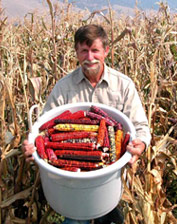EU parliament member says GMO coexistence is impossible
A panel of organic farming experts speaking at the BioFach organic tradeshow held in February in Nuremberg, Germany said genetically modified crops cannot coexist with organic crops. Friedrich Graefe zu Baringdorf, a German member of the European Parliament and an organic farmer, spoke strongly against coexistence, saying GMO contamination was the real issue.
Graefe zu Baringdorf dismissed the concept of coexistence of GM and organic farming. “We simply want to keep this rubbish out of our fields,” he said.
European governments are establishing coexistence laws that aim to compensate farmers who suffer losses due to contamination. But Graefe zu Baringdorf said, “Nature doesn’t go by legislation” with regard to GM pollen drift. Further he said, “It’s not a question of money. We just don’t want this stuff.”
He also quoted a Swiss scientist who said, “There should be an ocean separating GM and non-GM crops.”
“We don’t want traces of GMOs in our
products”
Other panel speakers agreed that coexistence is not possible. “The
views of coexistence are different (between GMO and organic supporters),” said
Maaike Raaijmakers, a representative with International Federation of
Organic Agricultural Movements (IFOAM). “We don’t want the
same thing. We don’t want traces of GMOs in our products.”
Reiner Huber, a German organic farmer, said, “Coexistence is impossible.” Huber said that coexistence implies that two forces of the same strength live together.
“That is not the case here,” he said.
Adrian Bebb, GM food expert, Friends of the Earth Europe, said, “We want to talk about contamination, but the discussion has been corrupted to talk about coexistence by the industry and the European Commission.”
Martin Miersch, manager, Life Food GmbH, a Germany-based organic tofu manufacturer, said, “Coexistence threatens our production.”
Life Food
has zero tolerance for GMO contamination of its products. “We
require 0.0 percent. GM material must be non-detectable,” he says.
Bebb called an EU proposal to establish a 0.9% threshold for GMOs in
organics “an outrage.”
Raaijmakers said consumers don’t want any GMOs in their products. “The market wants this. The threshold should be near zero.”
Liability on biotech companies; GM-free initiatives
Raaijmakers emphasized that the biotechnology industry should be held
responsible for losses that organic farmers suffer due to GMO contamination. “The
industry should be responsible,” she said. “If you cause
damage you are responsible.”
Several speakers said that because European public opinion is opposed to GM foods, they should not be grown in Europe. “Governments cannot ignore that a majority are opposed to GMOs,” said Huber.
Miersch suggested an EU-wide referendum to see if people want to have non-GMO farming zones.
Bebb said that 172 regions in the EU have declared themselves GM-free and that 4500 local governments are calling for restrictions on commercial production of GM crops. “It’s a big movement here. We have public opinion on our side,” he said.
Further, Bebb said the biotechnology
industry has not lived up to its promises. “The industry hasn’t
done anything. They have created two (types of GM) crops. There is nothing
about feeding the world,” he
said.
Miersch said, “The advantages of GM are zero.”
Graefe zu Baringdorf described biotechnology companies as a “small radical minority of capitalists’ interests. It’s outrageous what they are doing.”
©Copyright 2006. The Organic & Non-GMO Report.
(April 2006)





